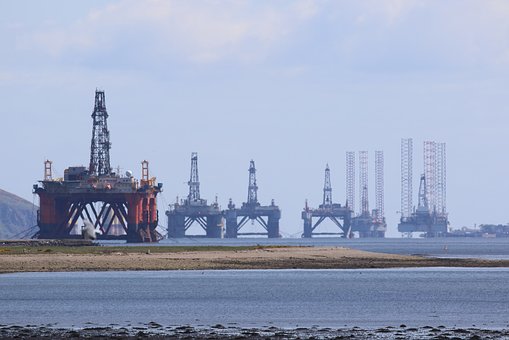MPs considering ban on North Sea exploration licences
MPS are considering implementing a new exploration licence ban signalling the beginning of the end for the North Sea oil industry.

The move is being considered as a step away from fossil fuels and as part of preparations for the climate summit which the UK Government is due to host in Glasgow this year.
The UK is already legally bound to deliver net-zero carbon emissions by 2050. It is understood that options being consulted on include an end to issuing licences in 2040 and an immediate temporary pause in licences.
One industry source said a decision is close. A ban on new licences would begin the terminal decline of British exploration in the North Sea and would be particularly controversial in Scotland.
An estimated 39pc of the 270,000 total UK jobs supported by the oil industry are north of the border, more than any other UK nation.
Oil and gas reserves from the UK Continental Shelf are dropping since their height in the 1970s and 1980s, but had been expected to play a significant role in its long-term energy needs, as well as in production of plastics and chemicals.
More than 30pc of the UK’S electricity in 2020 was generated by gas-fired power plants, while the offshore industry met about 45pc of its overall energy needs in 2019, according to industry figures, The Sunday Telegraph reports.
Although that will change as wind turbines and electric cars come to the fore, any restrictions on licences are likely to cause debate about whether the move would simply increase Britain’s reliance on imported gas and oil, potentially increasing emissions due to transportation requirements.
One industry source said: “We are going to still need oil and gas in this country. There is a lot of excitement around Cop26 and the imperative to be seen to do the right thing.”
The UK Government is keen to be on the front foot ahead of the United Nations Cop26 international climate change conference the UK is hosting in Glasgow in November.
Last week, ministers overruled a local authority and launched a public inquiry into whether a new mine to produce coking coal for steelmaking should be built in Cumbria, following accusations the plans would damage the UK’S international reputation on environmental issues.
Drillers and explorers have been investing heavily to cut emissions from their own operations, including by cutting flaring. Oil and gas rigs in the UK are responsible for about 10m tons of CO2 per year, about 3pc of the total.
Some have also branched out into developing carbon capture systems and hydrogen, which the Government sees as key to its push to developing a greener energy system. In 2020 Denmark set a precedent when it agreed to end all oil and gas exploration in the North Sea by 2050 and cancel its latest licensing round.
Environmental groups say a 2040 phase-out date is too late for the UK to reach its climate change goals. The Government has already brought forward a ban on the sale of new petrol and diesel combustion engines to 2030.
A spokesman for the Department for Business, Energy & Industrial Strategy, said: “Our review into the oil and gas licensing regime seeks to ensure it remains compatible with our target to reach net zero emissions by 2050.
“This commitment also forms part of the Energy White Paper published in December. We will agree a transformational North Sea Transition Deal with industry to create jobs, retain skills and deliver new business and trade opportunities to support the sector’s transition to a lower-carbon future.”







